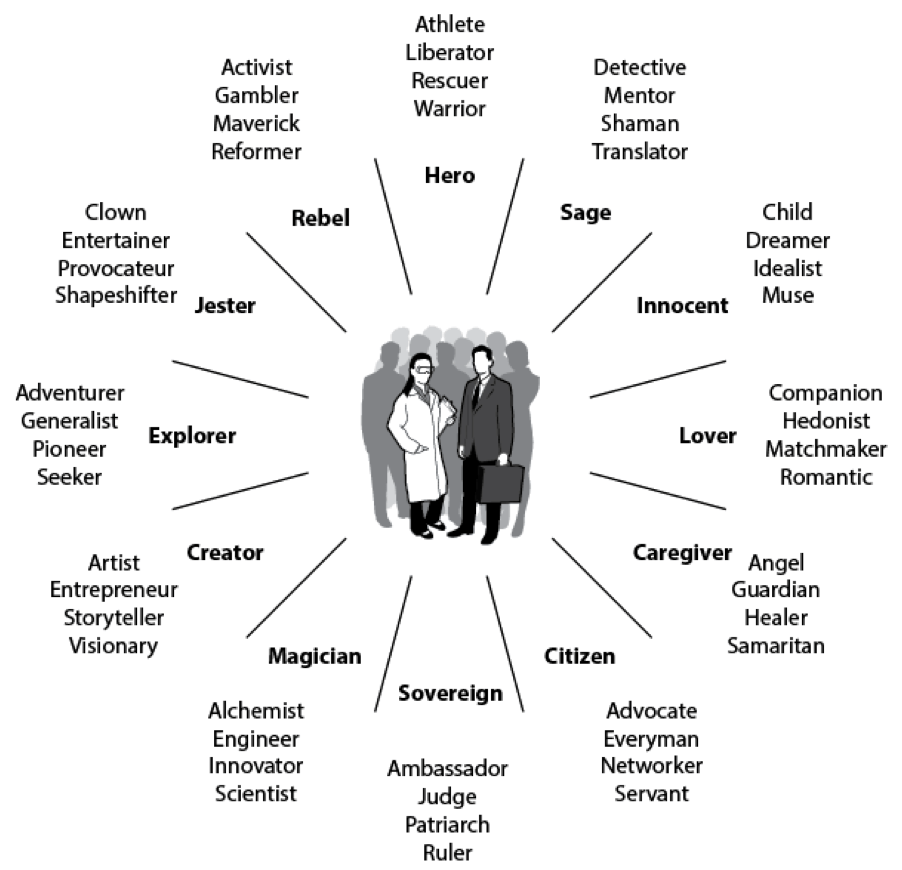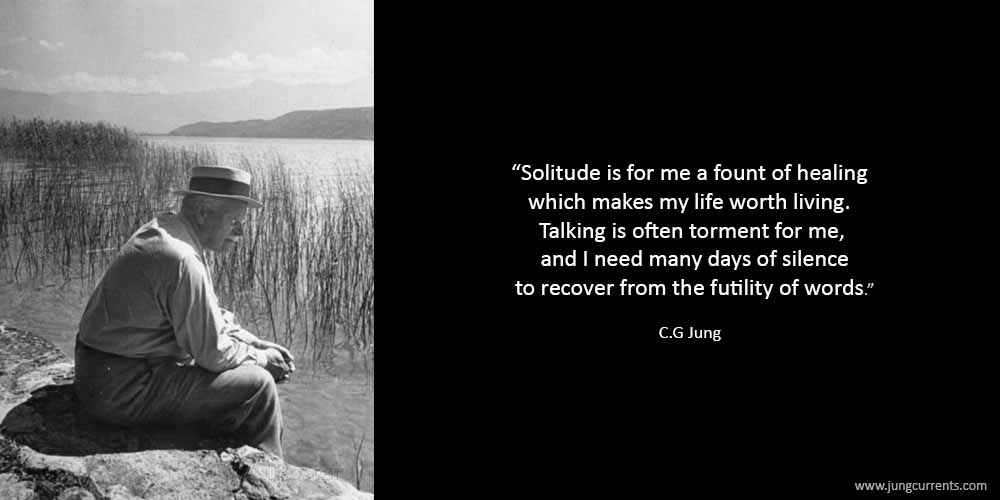
Wiki / CarlGustavJung
Inhaltsverzeichnis: (verbergen)
 Carl Gustav Jung (1875-1961) |
|
Ich will lieber ganz sein als gut! |
|
Im Chaos wird das Neue geboren. |
Jungs Leben und Werk
Von Jugend an war Carl Gustav Jung mit ausgesprochener Sensibilität, ja sogar Medialität begabt; und diese Fähigkeit,
mit der er sich oft einsam fühlte, führte dazu, dass er sein Leben der Erforschung des Menschen und des Bewusstseins wid-
mete. Zu den wichtigsten Begriffen und Thesen, die er maßgeblich erforscht und geprägt hat und die heute als psychologi-
sches Grundwissen geachtet und benutzt werden, zählen:
Als während seines Medizinstudiums die Frage aufkam, in welche Richtung er sich spezialisieren wollte, zögerte er lange,
bis er auf ein Lehrbuch der Psychiatrie stieß, das ihm den entscheidenden Impuls vermittelte: er wollte Psychiater wer-
den! Diese Wahl stieß bei seinen Kollegen und Professoren auf Unverständnis und auch Enttäuschung, da er eine attrak-
tive Assistentenstelle im Bereich der inneren Medizin ablehnte zugunsten der wenig glanzvollen Karriere als Psychiater.
Jung schreibt über das Gefühl, das seinen Entschluss begleitete:
|
Jung stützte sich stark auf seine Intuition, die ihn Schritt für Schritt durch die Wirrnis seines Berufs als Jungpsychiater […] es war der Eintritt ins Weltkloster, und die Unterwerfung unter das Gelübde, nur das Wahrscheinliche, das Durchschnittliche, das Banale und das Sinnarme zu glauben, allem Fremden und Bedeutendem abzusagen und alles Ungewöhnliche auf das Gewöhnliche zu reduzieren. Dies war für ihn, den Sensiblen mit dem Bedürfnis, die Wahrheit zu erfahren, keine Option und veranlasste ihn zum Ausruf: Da stak ich nun in einem Beruf, in dem ich mich überhaupt nicht auskannte!
Schritt für Schritt erarbeitete sich Jung seine Therapiemethode in der Arbeit mit seinen PatientInnen. Der Begriff "Methode" wäre al-
Zu Beginn seiner Tätigkeit als Psychiater interessierte er sich weni- Im Grunde genommen entdecken wir im Geisteskranken nichts Neues und Unbekanntes, sondern wir begegnen dem Untergrund unseres eigenen Wesens.
Jung war Praktiker und Therapeut, kein Theoretiker: Wir brauchen eine praktische Psychologie, die praktisch rich- tig ist, das heißt diejenigen Erklärungen liefert, die sich in ih- ren praktischen Ergebnissen bestätigen lässt. Auf dem Kampfplatz der praktischen Psychotherapie sind wir auf lebensfähige Resultate angewiesen, wo wir dann nicht nur Theorien aufstellen können, die den Patienten nichts angehen oder ihn sogar schädigen. Hier kommt es nun, oft in lebensbedrohender Weise, darauf an, ob man aus der Physis oder aus dem Geist erklärt.
Oft arbeitete Jung mit Assoziationsexperimenten, um das Unbewusste eines Menschen beleuchten und viele jener As- |
| Quelle: ► Carl Gustav Jung (1875-1961) Schweizer Psychiater, Psychoanalytiker, Gründer einer neuen Schule der analytischen Tiefenpsychologie, Autor, Aniela Jaffe, Autobiografie Erinnerungen, Träume, Gedanken von C. G. Jung, Zürich und Düsseldorf, 1971, Walter Verlag, 5. November 1993, Juni 2006 |
|
Dass Jung dieses für seine Zeit höchst außergewöhnliche Verfahren nutzte, lag wohl in erster Linie daran, dass er gar keine andere Wahl hatte. Schon als Fünfzehnjähriger empfand er stark, dass er aus zwei Persönlichkeiten bestünde, Alle diese Eigenschaften wie Lächerlichkeit, Gemeinheit, Dummheit, Lügenhaftigkeit und diese abscheuliche Eigenliebe kannte ich nur zu gut aus mir selbst, d.h. aus jener Persönlichkeit Nr. 1, dem Schuljungen von 1890. Daneben gab es jedoch einen Bereich, wie einen Tempel, in dem jeder Eintretende gewandelt wurde. Von der Anschauung des Weltganzen überwältigt und seiner selbst vergessend konnte er nur noch wundern und be- wundern. Hier lebte "der Andere", der Gott als ein heimliches, persönliches und zugleich überpersönliches Ge- heimnis kannte. Hier trennte nichts den Menschen von Gott. Ja, es war, wie wenn der menschliche Geist zu- gleich mit Gott auf die Schöpfung blickte.
Sein Leben lang hat diese zweite Persönlichkeit, die Seele, die Hauptrolle in Jungs Leben gespielt, und er hat versucht, jenen Inhalten und Informationen freien Lauf zu lassen, die von Innen an ihn heranwollten. Er machte auch immer wie-
Jung war ein Schüler und für eine gewisse Zeit auch Freund und Protegé von Sigmund Freud, den er bewunderte und als die erste wirklich bedeutende Persönlichkeit, die mir je begegnete, bezeichnete. Allerdings störte sich Jung bald an der dogmatischen Enge Freuds, die ihn alle psychischen Vorgänge auf den sexuellen Trieb und den Todestrieb reduzie-
Darauf folgte für Jung eine Zeit der Verwirrung und Desorientierung – die verging, als er nach vielen Widerständen von Seiten des Egos seinem Impuls folgte, wie ein Kind zu spielen, um sich bewusst auf sein eigenes Unbewusstes einzu- Ich sah, dass soviel Fantasie festen Bodens bedurfte, und dass ich zuerst ganz in die menschliche Wirklichkeit zurückkommen musste.
Er war dankbar für seine Familie und seine ärztliche Praxis, die es ihm nicht erlaubten, fortwährend in höherdimensio- Denn wer seine Erkenntnis nicht als ethische Verpflichtung anschaut, verfällt dem Machtprinzip.
Es können daraus destruktive Wirkungen entstehen, die nicht nur andere zerstören, sondern auch den Wissenden sel-
Jung schaffte diese heikle Gratwanderung, indem er einerseits dem Ruf seiner Seele folgte und seine Intuitionen, Träu-
Als einer der großen Pioniere und Lehrer der Bewusstseinsarbeit unserer Zeit hat Carl Gustav Jung eine wertvolle Platt-
Mit eigenen Worten beschreibt er, wie er das Leben empfand: Das Leben ist mir immer wie eine Pflanze vorgekommen, die aus ihrem Rhizom lebt. Ihr eigentliches Leben ist nicht sichtbar, es steckt im Rhizom. Das, was über dem Boden sichtbar wird, hält nur einen Sommer. Dann ver- welkt es – eine ephemere Erscheinung. Wenn man an das endlose Werden und Vergehen des Lebens und der Kulturen denkt, erhält man den Eindruck absoluter Nichtigkeit; aber ich habe nie das Gefühl verloren für etwas, das unter dem ewigen Wechsel lebt und dauert. Was man sieht, ist die Blüte, und die vergeht. Das Rhizom dauert. |
| Quelle: ► Carl Gustav Jung (1875-1961) Schweizer Psychiater, Psychoanalytiker, Gründer einer neuen Schule der analytischen Tiefenpsychologie, Autor, Aniela Jaffe, Autobiografie Erinnerungen, Träume, Gedanken von C. G. Jung, Zürich und Düsseldorf, 1971, Walter Verlag, 5. November 1993, Juni 2006 |
|
Am Mittag eines Sommertages im Jahr 1887 überquert der zwölfjährige Carl Gustav Jung auf seinem Heimweg von der Schule den Basler Münsterplatz. Bei herrlich blauem Himmel spiegelt das Dach des Münsters den strahlenden Son- Als er weiterdenken will an Gott auf seinem Thron und …, stockt sein Gedankenfluss unvermittelt. Etwas schnürt ihm die Kehle zu. "Bloß nicht weiter denken, bloß nicht!"
Der verbotene Gedanke wirft den Knaben in eine quälende Gewissensnot, die drei Tage und drei Nächte anhält. Er schläft nicht mehr, ist blass, un-
In der dritten Nacht löste sich die Spannung. Aus der Distanz von mehr als einem halben Jahrhundert schreibt Jung darüber: Ich fasste allen Mut zusammen, wie wenn ich in das Höllenfeuer zu springen hätte und ließ den Gedanken kom- men. Vor meinen Augen stand das schöne Münster, darüber der blaue Himmel. Gott sitzt auf goldenem Thron, hoch über der Welt, und unter dem Thron fällt ein ungeheures Exkrement auf das neue bunte Kirchendach, zer- schmettert es und bricht die Kirchenwände auseinander. Das war es also. Ich spürte eine ungeheure Erleichte- rung und eine unbeschreibliche Erlösung. An Stelle der erwarteten Verdammnis war Gnade über mich ge- kommen und damit eine unaussprechliche Seligkeit, wie ich sie nie gekannt hatte. […] Aber der Gehorsam ist es gewesen, der mir die Gnade gebracht hat, und seit jenem Erlebnis wusste ich, was göttliche Gnade ist. Carl Gustav Jung (1875-1961) Schweizer Psychiater, Psychoanalytiker, Gründer einer Schule der analytischen Tiefenpsycho- logie, Autor, Aniela Jaffe, Autobiografie Erinnerungen, Träume, Gedanken von C. G. Jung, S. 45-46, Zürich und Düsseldorf, 1971, Walter Verlag, 5. November 1993, Juni 2006
Zur 'Gotteswelt' gehörte alles 'Übermenschliche', blendendes Licht, Finsternis des Abgrunds, die kalte Apathie des Grenzenlosen in Zeit und Raum und das unheimlich Groteske der irrationalen Zufallswelt. 'Gott' war für mich alles, nur nicht erbaulich. Carl Gustav Jung (1875-1961) Schweizer Psychiater, Psychoanalytiker, Gründer einer neuen Schule der analytischen Tiefenpsychologie, Autor, Aniela Jaffe, Autobiografie Erinnerungen, Träume, Gedanken von C. G. Jung, S. 77, Zürich und Düsseldorf, 1971, Walter Verlag, 5. November 1993, Juni 2006
Die Menschheit ist in der großen Hauptsache psychologisch noch in einem Kindheitszustand – eine Stufe, die nicht übersprungen werden kann. Weitaus die meisten bedürfen der Autorität, der Führung und des Gesetzes. Diese Tatsache darf nicht übersehen werden. Die paulinische Überwindung des Gesetzes fällt nur dem zu, der es versteht, anstelle des Gewissens die Seele zu setzen. Carl Gustav Jung (1875-1961) Schweizer Psychiater, Psychoanalytiker, Gründer einer neuen Schule der Tiefenpsychologie, Autor, Die Beziehungen zwischen dem Ich und dem Unbewussten, Walter Verlag, 2. Auflage Februar 1984 |
| Referenz: ► Carl Gustav Jung (1875-1961) Schweizer Psychiater, Psychoanalytiker, Gründer einer Schule der Tiefenpsychologie, Autor, Aniela Jaffe, Autobiografie Erinnerungen, Träume, Gedanken von C. G. Jung, Zürich und Düsseldorf, 1971, S. 45-46, Walter Verlag, 5. November 1993, Juni 2006 |
| Siehe auch: ► Gnade und ► Carl Gustav Jungs verbotene Gedanken – eine Gnadenerfahrung |
Als der Schweizer Psychoanalytiker Carl Gustav Jung sich von Sigmund Freud und dessen bevormundender Freundschaft losgesagt hatte, erlebte er eine Zeit der Desorientierung. Nach vielen Kämpfen gegen innere Widerstände wagte er es, seinem Impuls zu folgen und wie ein Kind zu spielen, um sich bewusst auf sein eigenes Unbewusstes einzulassen und es zu erforschen. Aus Kieseln baute er eine Stadt, und er malte immer wieder Mandalas.
Daraufhin erschienen ihm zwei Geistwesen namens Philomen und Salome, die sich als seine Geistführer vorstellten. Er trug den Verlauf der langen Gespräche seiner inneren Aspekte ins "Rote Buch" ein. Ein Geistwesen mit Namen Basilides in Alexandria übermittelte ihm medial die Septem Sermones ad Mortuos, [Sieben Belehrungen der Toten], 1916.
Damals spukte es im Haus der Familie Jung des Öfteren, was offen-
bar niemanden befremdet hatte, und Jung selbst hatte häufig inten-
sive Träume und Visionen im Wachzustand. Noch jung an Jahren wurden Jung in symbolischer und bildlicher Form alle Informationen heruntergeladen, die sein späteres Lebenswerk ausmachen. Die restlichen fünfzig Jahre seines Lebens verbrachte er damit, diese Botschaften zu erden und mündlich und schriftlich zu erfassen:
Seinen Auftrag als Übermittler nahm er an:
Er war dankbar für seine Familie und für seine psychotherapeutische Praxis, die es ihm verwehrten, sich längerfristig in anderen Sphären aufzuhalten. Es war ihm bewusst, dass er sich nahe an der Grenze zur Verrücktheit bewegte, so wie er es an seinen nervenkranken Patienten in de Klinik beobachtet hatte.
Jung, der dem Ruf der Seele folgte, verzichtete auf eine akademische Laufbahn als Professor, um seinen Intuitionen, Träumen und Visionen zu folgen. Er studierte Mythologie und Alchemie und lernte im Austausch auch von seinen Patienten.
| Siehe auch: ► Tabu und ► Zwei Seelen, ach, in meiner Brust und ► Gnadenerlebnis des Knaben Jung |
Der Schweizer Psychiater Carl Gustav Jung gelangte zur Entdeckung der "Archetypen", nachdem ihm die Ähnlichkeit vieler Bildmotive in Mythen, Träumen und Phantasien Geisteskranker aufgefallen war, die keinen direkten Kontakt miteinander gehabt haben können. Ausschlaggebend war ein Erlebnis mit einem psychiatrisch kranken Patienten, der Jung einmal aufforderte, in die Sonne zu blinzeln und dabei den Kopf zu drehen. Als Jung ihn fragte, was denn dort zu sehen sei, antwortete dieser:
Jung hielt dies für eine abstruse Halluzination, aber zeichnete sich das Bild auf.
Vier Jahre später las er in einem gerade veröffentlichten Buch über einen grie-
chischen Papyrus, in dem vom Mithras-Kult berichtet wird. Darin wurde eine
Röhre erwähnt, die vom Antlitz der Sonne herabgelassen wird und den Ur-
sprung des Windes darstellt. Das Bemerkenswerte ist nicht nur die Überein-
stimmung zwischen der Halluzination des Kranken und der über 2000 Jahre
alten Schrift, sondern auch die Tatsache, dass der Papyrus zum Zeitpunkt der Halluzination noch gar nicht veröffentlicht war. Der Kranke, der Volksschul-
bildung besaß und nie gereist war, konnte nicht auf dem Wege des Lesens zu seinem Bild gekommen sein.
Jung begann, weitere Träume von Kindern und kulturhistorisch nicht gebildeten Patienten genauer zu betrachten und fand ähnliche Parallelen zu Sagen- und Märchenmotiven. Das führte ihn zu einem intensiven Studium der Mythen ver-
schiedener Völker, bei dem sich seine Vermutung erhärtete, dass deren ähnliche Motive kaum durch Berührungen entstanden waren, sondern durch generelle, im kollektiven Unbewussten verankerte Prädispositionen. Diese nannte er Archetypen:
| Quelle: ► [Gelöschter] Blogartikel von Rüdiger Sünner (*1953) deutscher Dokumentarfilmregisseur, Autor, "Drachen, Helden, Nachtmeerfahrten". Die Archetypenlehre von C.G. Jung, Datum unbekannt |
| Siehe auch: ► Archetypen |
Quaternität, die Vierheit, ist in der Theosophie, Nummerologie und im AQUAL-System die Einheit von vier wesentlichen Kom-
ponenten. Die Theosophen sehen den Menschen aus vier Körper bestehend: den physischen, den Äther-, den Astralleib und
das Selbst [Geistkörper]. Die Astrologie arbeitet ebenfalls mit »Vierheiten«. Die Einteilung der zwölf Tierkreiszeichen birgt drei
Kreuze mit je vier Zeichen, die beweglichen, festen und Kardinalzeichen.
Die Erfahrungsebenen Realität, Entsprechung zur Realität (Symbolik), Umkehrung (Paradox) und Neuschöpfung entspre-
chen auch dem Aufbau eines Menschen, der aus
| Referenzen: de.Wikipedia-Einträge ► Quaternität und ► I-Ging |
| Siehe auch: ► Gesetz 3:1 und ► Tao und I Ging |
Der Schweizer Psychiater Carl Gustav Jung saß in seinem Büro und hörte einer Patientin zu, die ihm ihren Traum von einem goldenen Skarabäus (Mistkäfer) erzählte. Die dominierende Rationalität der Frau hatte bislang ihre Therapie behindert. Jung wusste, dass der Skarabäus ein altes ägyptisches Symbol für Wiedergeburt ist.
Jung fragte sich, ob der Traum wohl ein Fingerzeig des Unbewussten auf einen bevorstehenden Durchbruch sei. Gerade, als er der skep-
tischen Frau seine Interpretation mitteilen wollte, hörte Jung ein
schwaches Klopfen am Fenster seiner Praxis. Als er dem Zeichen
nachging, sah er, dass tatsächlich ein goldgrüner, skarabäusähnlicher
Käfer gegen die Scheibe schlug. Er öffnete das Fenster. Der Käfer
flog ins Zimmer und versetzte der Frau damit einen derart nachhalti-
gen Eindruck, dass ihr Widerstand durchbrochen wurde. Jung dach-
te daraufhin verstärkt über bedeutungsvolle Zufälle nach. In einem Vortrag an der Londoner Tavistock-Klinik im Jahr 1935 in London prägte er den Begriff Synchronizität.
In seinem weltbekannten Erfolgsroman Die Prophezeiungen von Celestine (1993) sieht der Urheber James Redfield fol-
gende Zukunft voraus:
| Siehe auch: ► Synchronizität und ► Die zwölf Celestine-Erkenntnisse – Romane von James Redfield |
Persönliche Bekenntnisse
Empfehlung
Schlussfolgerung
Einsicht
Offenbar bin ich [...] um eine Kleinigkeit weiser, eben darum, dass ich, was ich nicht weiß, auch nicht zu wissen glaube. Sokrates, nach Platons Apologie des Sokrates, Reclam, Philipp, jun. Verlag, Ditzingen, 1986
|
Jung beschreibt in einem Brief an Bill W. Rowland H.s Verlangen nach Alkohol kurz bevor dessen Tod.
|
Zitate, die Jung zugeschrieben wurden
Problematische Zitate/Einstellungen von Jung
In einer 1951 veröffentlichen Arbeit vertrat er im gleichen degradierenden Sinn die Meinung, bei der Frau sei der Eros Ausdruck ihrer wahren Natur, während ihr Logos nicht selten einen bedauerlichen Zwischenfall bedeute. Wenn sie vom Animus geritten werde, lasse sie sich von keiner Logik der Erde erschüttern, so dass der Mann in vielen Fällen das Gefühl habe (und er habe nicht ganz Unrecht damit), einzig Verführung oder Verprügelung oder Vergewaltigung hätte noch die nötige Überzeugungskraft. (zu dieser Zeit war Jung über 80 Jahre alt).
Interviewauszüge zum Thema Adolf Hitler mit Carl Gustav Jung, 1939
Interviewauszug mit Carl Gustav Jung zum Thema Adolf Hitler
erschienen in der Londoner Sonntagszeitung The Observer, Oktober 1936
| Quelle: ► Miguel Serrano (1917-2009) chilenischer Diplomat, Vertreter des esoterischen Hitlerismus, Autor, Adolf Hitler – der letzte Avatar PDF (Archiv) (vergriffen), S. 120-121, Alfabeta Impresores, Santiago/Chile, 2004 |
Personal avowals
Jung, a former protege and later critic of Freud, abhored the idea of blinded "Jungian" disciples.

Jung was overwhelmed with 'indescribable relief' and wrote that 'grace had come upon me.' Mixed with this joy there was also darkness. He thought he must be 'a devil or a swine and be infinitely depraved to have had such a thought.'
A. R. Pope, translator, pamphlet The Transcendent Function, S. 89, Students Association, C. G. Jung Institute, Zürich, 1957
Recommendations
Jung married Emma Rauschenbach in 1903. The couple had five children and remained married until Emma's death in 1955,
although Jung's extramarital affairs were extensive.
Conclusions
Only if this tension is endured – which always ensues a state of suffering – can a third term be born, which transcends,
or surpasses, the opposites and so combines parts of both positions into an unknown 'new creation'.
Insights
Extracted from an extraordinary letter written at age 70 in 1945. As an organizer of conferences Jung's friend Mrs. Fröbe had asked him to comment on her great inner struggle between the demands of her career and the demands of her family. Jung pleaded to reconcile the struggle between the male [selfbased, personal, solar approach] and the female [SELF-based, impersonal, lunar approach] via patient endurance in the fire of the crucible until transformation has come about.




Jung frequently painted or drew mandalas. He only learned to understand the mandala symbology many years later. He saw mandalas as images of "squaring the circle" and as "cryptograms" of the actual state of the self.

Masculine split-mindedness


Total solar eclipse – conjunctio of Solis et Lunae
Jung posits that the final transcendence of the opposites (i.e. non-duality) is impossible because meaning depends on the tension between them.
Truth has no opposites, such as falsity or 'off-ness.' Nothing is hidden from the field of consciousness. Dr. David R. Hawkins, I. Reality and Subjectivity, S. 80, 2003
Grimm's fairy tale Rumpelstiltskin
|
| ► Blog article 22 of the Most Insightful Quotes from Carl Jung, presented by awaken.com, Justin Gammill, 2. July 2015, reposted 10. January 2016 |
überliefert von Carl Gustav Jung über die Rollen von Frauen und Männern während eines Paradigmenwechsels
Verratene Liebe – Falsche Götter, S. 107, Klett-Cotta, 2. Auflage November 2003
Delivered from Carl Gustav Jung referring to paradigmal shifts
Jung was holding a college seminar on archetypes in the 30s when he was approached by a young female student that was visibly upset. Jung asked her what was troubling her. Then, she accused Jung of being an atheist. Jung was confused and asked the student where she had gotten that idea. The student paraphrased a quote she had read in which Jung said he didn't believe God existed. Jung smiled and answered as follows:
Joseph Campbell, Ph.D. (1904-1987) US American mythologist, expert in comparative mythology and comparative religion,
Pathways To Bliss, ReadHowYouWant, large edition 16. May 2012, cited in: Jurnal blogspot Archetypes, Relationship,
Shadow, Anima/Animus, and Personal Myth by Joseph Campbell, 30. July 2013

| ||||||||||||||||||||||||||||||||||||||||||||||||||||||||||||||||||||||||||||||||||||||||||
| Based on source: ► Removed Blog article by Joseph Dillard, Ph.D. (*1949) US American psychotherapist, developer of dreamwork method Integral Deep Listening (IDL), author, Jungian Psychology and Integral Deep Listening, presented by Dream Yoga, 2015 |
| See also: ► Key contributions to psychology – Carl Gustav Jung ► Jungian archetypes: Self ♦ Shadow ♦ Anima⇔Animus ♦ Persona ► Ladder of 'personal' evolution – Joseph Dillard ► Quotes on Socrates – Joseph Dillard ► Listening |
Throw yourself wholeheartedly into any spiritual group that appeals to you, whether you believe in it or not, and hope that in your case a miracle may occur.
Carl Gustav Jung's advice to his client, the alcoholic Rowland Hazard III [Rowland H.] (1881-1945) US American businessman, precursor in the events leading to the formation of Alcoholics Anonymous; cited in: Alcoholics Anonymous Comes of Age. A Brief History of A. A. by Alcoholics Anonymous World Services, June 1957
| |||||||||||||||||||||||||||||||||
| Source: ► Article Carl Jung (1875-1961), presented by the publication Good Therapy, 9. July 2013, updated 6. July 2015 |
| |||||||||||||||||||||||||||||||||||||||||||||||||||||||
| Direct source: ► Article The 4 Major Jungian Archetypes, presented by the journal Very Well Mind, Kendra Cherry, US American psychology expert, medically reviewed by Steven Gans, M.D., updated 30. June 2020 |
| Original references featuring Carl Gustav Jung (1875-1961) Swiss psychiatrist, psychoanalyst, founder of a new school of depth psychology, author ► Book Carl Gustav Jung (1875-1961) Swiss psychiatrist, psychoanalyst, founder of a new school of depth psychology, author, Man And His Symbols, 1964, Dell, 15. August 1968 ► Book Joseph Campbell, Ph.D., editor, The Portable Jung, chapter "Phenomenology of the Self", S. 147, Penguin Books, 9. December 1976 |
| Reference: en.Wikipedia entry ► Jungian archetypes |
| See also: ► Archetypes |
|
|
| ||||||||||||||||||||||||||||||||||||||
| Source: ► Removed article Carl G. Jung Archetypes – The 4 Stages of Life, presented by blogger Purpose Fairy, 24. November 2010 References: ► [*] Article Stages Of Living Your Legacy, presented by Meridian Life Design, Vancouver, Canada, 2009 1. Reflective discovery, 2. Intuitive clarity, 3. Creative synergy, 4. Generative potentiality |
| See also: ► Six archetypes of love – Allan Hunter ► Four rounds of consciousness evolution ► Four consecutive levels of listening ► God brews the coffee. ► Alchemical triple transmutation |
After their differences over concepts of the unconscious and the consequent falling-out with Sigmund Freud in 1912 the
Swiss psychiatrist Carl Gustav Jung embarked on a 16-year-period which he called his 'confrontation with the uncons-
cious', wherein he received and wrote the informally known Red Book. Bound in red leather the originally titled Liber Novus
(Latin for New Book) contained his dreams, phantasies, and visions written in gothic calligraphy and illustrated with paintings.
Only very few people had seen this book for decades. In 2001, Jung's heirs allowed scholars to access the secret manuscript. After a prolonged period of preparation and negotiation it was released both in German and English to scholars and the gene-
ral public in October 2009 – more than 50 years past Jung's death.
Jung considered The Red Book as his most important work, as the result of his extended self-exploration and soul
searching process. During the process of writing he developed his principal theories on
Having retreated from contemporary mainstream psychotherapy Jung was thrown into a depression. Psychically gifted from youth, he was visited by inner archetypal aspects. These authentic spirit figures were:
He communicated with them via his self-developed technique active imagination. As a rule he insisted that the figures
that he encountered would only leave after they had revealed to him what they held in store.
From 1913 until 1930 Jung had worked intensely with mythic imagery. He admitted that he was "menaced by a psychosis"
during the writing period of The Red Book:
Jung's broader outlook transformed psychotherapy from treatment of the sick into an approach of higher development of the personality. "The Red Book" will cast new light on the making of modern psychology.
| Sources featuring Carl Gustav Jung (1875-1961) Swiss psychiatrist, psychoanalyst, founder of a new school of depth psychology, author ► Book Sonu Shamdasani, Indian historian, editor, The Red Book, 205-page illustrated manuscript, Philemon Series, The Philemon Foundation and W.W. Norton & Company, 9. October 2009 ► Video interview Jung himself Archetypes Freud, YouTube film, 4:35 minutes duration, posted 25. October 2008 |
| ||||||||||||||||
| Assessor: ► Dr. Marie-Louise von Franz (1915-1998) Swiss Jungian psychologist, scholar, author |
| Written references: ► Blog article Freud vs Jung – Similarities and Differences, presented by Harley Therapy, 20. February 2014 ► Article Freud and Jung: A Meeting of Minds, presented by the centre-left British online newspaper The Independent, 23. April 2010 |
| Video assessment: ► Freud and Jung – The main differences, presented by Happiness Academy, YouTube film, 4:05 minutes duration, posted 3. September 2012 |
| See also: ► Sigmund Freud |
|
Links zum Thema Carl Gustav JungLiteratur
Literature (engl.)
Wikipedia entry: The Red Book [Liber Novus]
Delving into the perspective Unus mundus
Externe Weblinks
Linkless article
External web links (engl.)
1. Good mental health – "I am not what happened to me, I am what I choose to become." Carl Jung Book reviews
Angela M. Sells, Sabina Spielrein. The Woman and the Myth, Suny Press, August 2017
Critical texts
Exposing Jung's collaboration with the American secret service, protected by future CIA Director Allen Dulles (1942-1945)
Audio- und Videolinks
Audio and video links (engl.)
Linkless media offers
|
Englisch Wiki
Hawkins
1 Autobiografische Notizen aus: Carl Gustav Jung (1875-1961) Schweizer Psychiater, Psychoanalytiker, Gründer einer neuen Schule der analytischen Tiefenpsychologie, Autor, Aniela Jaffe, Herausgeberin, Autobiografie Erinnerungen, Träume, Gedanken von C. G. Jung, Zürich und Düsseldorf, 1971, Walter Verlag, 5. November 1993, Juni 2006 ⇑
2 Stanser Wunder durch Bruder Klaus erzählt in: Video Abschlusskonferenzvortrag von Armin Risi armin-risi.ch (*1962) Schweizer Veda-Philosoph, Dichter, Sachbuchautor, Aus dem Zeitalter der Spaltung zur Einheit: Die Prophezeiungen der Zeitenwende, Kongress "Welt im Wandel", veranstaltet vom Welt im Wandel.TV, Würzburg, 25. September 2022, YouTube Film, Minute 18:43-40:40, 51:09 Minuten Dauer, eingestellt 15. September 2023 ⇑
3 Carl Gustav Jung, Swiss psychiatrist, Sonu Shamdasani, Indian historian, editor, The Red Book, 205-page illustrated manuscript, Philemon Series, The Philemon Foundation and W.W. Norton & Company, back cover, 9. October 2009 ⇑